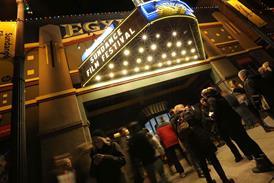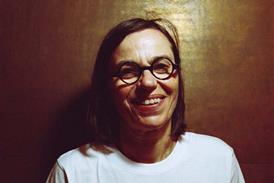The Oscar-winning Danish filmmaker follows the romance Love Is All You Need with this darker tale of a detective (Nikolaj Coster-Waldau) who crosses a moral line after a family tragedy.
TrustNordisk handles sales; the film premieres in Special Presentations on Tuesday. The cast also features Ulrich Thomsen, Maria Bonnevie and Nikolaj Lie Kaas. Bier’s frequent collaborator Anders Thomas Jensen wrote the script.
Sisse Graum Jorgensen produces for Zentropa, with co-producers Zentropa International Sweden, FilmFyn and Film i Väst. Supporters include The Danish Film Institute, The Swedish Film Institute, Eurimages and Nordisk Film & TV Fond in cooperation with DR, SVT. Nordisk will release locally.
After Toronto, A Second Chance goes on to play in competition in San Sebastian.
This film sounds quiet intense, are these themes you were thinking about or was it [screenwriter] Anders Thomas Jensen?
It is intense. It’s a thing between Anders Thomas and myself where we always end up having these discussions about moral dilemmas. It’s interesting, this thing of who is really right and who is really wrong, and the desire we have to make a black and white decision can be totally impossible. And we also thought there is a Scandinavian tradition of dealing with complicated police officers, that has always intrigued me. Having an eye to a thriller and yet really dealing with profound human dilemmas.
So is it a black-and-white story or shades of grey?
It’s not grey, I think it turns you around. It’s, ‘Oh, I thought I was in this street but I’m on a different corner. ‘I like the labyrinth of emotions that you get involved with.
How do you work with Anders Thomas?
He writes, but we work on it together. All our films have a slightly different process. But there is a similar pattern to it. We go away and we do a blueprint of a story and then he writes, and then I get to criticize and say, ‘I like this bit but not that part,’ and then he rewrites.
It’s pretty extreme and he wrote it pretty extreme. It was surprising.
Do you ever think it was too extreme for you?
No, I think one of the things that scares me more than anything else as a filmmaker is becoming complacent or repeating myself.
This is a film more about fatherhood than motherhood?
Anders Thomas is a man, and he has small kids. It’s got quite a strong personal element.
You’re also a parent, did that factor into you wanting to tell this story?
I think it factors into all of my movies in a way…What happens when you are a parent is that you feel this extreme love and it’s different from all other kinds of love you’ve felt before. Which is also scary.
Had you worked with Nikolaj Coster-Waldau before?
I’ve seen him around and I’ve always wanted to do a film with him but it had to be the right film. He’s very sincere, as an actor and as a human being. That particular trait was so perfect for this film. And he’s very handsome (laughs).
He’s a very interesting mix of being powerful, forceful, competent, and at the same time he’s got a real vulnerable side.
I don’t like showy performances — human beings rarely behave in a showy way, they might behave in extremes. I like that there’s an enigmatic quality to what Nikolaj is doing.
How did you prepare with Nikolaj?
We have a few readings with Andres Thomas and we go over the script. But then I also tend to be obsessive with costume. Once you have the right clothes and the right look, a lot of the character comes into that. I spend quite a lot of time with makeup and costume and the actor to discuss that.
I do feel that talking too much about the psychology tends to kill it. It’s a little bit like sex, If you talk to much about it, it dies.
There are scenes of a baby in an unsafe environment in the film, was that stressful to shoot?
No, it’s a movie set. We had several babies. And they were so cute. I love babies, so I actually quite enjoyed it. It’s hard to watch but when we did it, it was quite a lot of fun and nice. I had the great pleasure and honour of doing something I hadn’t done before.
This is quite a different film than Love Is All You Need?
I think this one is really different…One of the fun things about making movies is the potential that people will leave the cinema and actually talk about films
Do you prefer to shoot in Denmark or away?
When you shoot in Fune [where A Second Chance shot], it’s not really home [she lives in Copenhagen]. If I’m really honest I probably prefer not shooting at home, I quite like being in a ‘movie trance’ and just not thinking about anything else. Just allowing for a few months to be totally obsessive about it…You’re creating a world and it’s really exciting just to be in that world.
Does the Danish film industry feel healthy to you at the moment?
It does feel healthy. But I always feel part of this certain generation, in a similar age group, and I’m wondering where the young, wild, innovative generation is?
Why did you want to premiere the film in Toronto?
It’s one of the most important festivals and it’s a film industry festival. Also the Toronto audience is really engaged, and it’s North America. Yet, being Canada, it still has a strong European element to it.
There is a tendency for the festivals in Europe to be very male, more classically European, arthouse. Toronto is not really like that. It doesn’t mean they are super mainstream but Toronto is a festival that is very accurately in tune with what’s happening with the audience. And the world in general.





















No comments yet